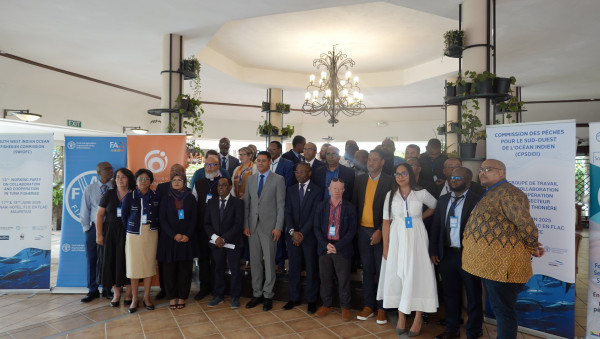Mauritius: South West Indian Ocean Fisheries Commission (SWIOFC) Member States strengthened regional cooperation for sustainable Tuna fisheries management

The Working Party on Collaboration and Cooperation in Tuna Fisheries (WPCCTF) from the South West Indian Ocean Fisheries Commission (SWIOFC), met in Mauritius to continue its work on strengthening regional cooperation for the effective management of tuna fisheries and other highly migratory fish in the region.
The 13th Session of the WPCCTF brought together during two days (17-18 June 2025) 11 from the 12 SWIOFC countries – Comoros, France, Kenya, Madagascar, Maldives, Mauritius, Mozambique, Seychelles, Somalia, South Africa and Tanzania. Partner organizations, namely the World Bank, the Indian Ocean Commission (IOC), the World Wide Fund for Nature (WWF), the Nairobi Convention – UNEP, the Southern African Development Community (SADC), and the South West Indian Ocean Tuna Forum (SWIOTUNA) attended the meeting as SWIOFC Observers. Other Regional Fishery Bodies – the Southern Indian Ocean Fisheries Agreement (SIOFA) and the Indian Ocean Tuna Commission (IOTC)- actively participated in the discussion with members, specifically regarding SWIOFC compliance and reporting requirements.
Patrice Talla, FAO Subregional Coordinator for Southern Africa, welcomed the participants and emphasized the importance of the WPCCTF as a platform for dialogue and collective action, underscoring the need for coastal states to manage tuna stocks responsibly within their Exclusive Economic Zones (EEZs) and to collaborate regionally to rebuild overexploited stocks, particularly yellowfin tuna. Talla stressed the importance of strengthening national capacities to comply with Conservation and Management Measures (CMMs) and to implement effective Monitoring, Control and Surveillance (MCS) systems.
Mbuli Charles Boliko, FAO Representative in Madagascar, Comoros, Mauritius and Seychelles, highlighted the significance of the Indian Ocean as the second-largest tuna-producing region globally, playing a vital role in supporting national economies and livelihoods. Boliko stressed that challenges such as Illegal, Unreported and Unregulated (IUU) fishing, climate-induced migratory shifts, and external competition require a unified regional response grounded in science, cooperation, and shared commitment.
The Working Party members acknowledged the progress made in the region, including the adoption and progressive implementation of the SWIOFC-led instrument, the MTC Guidelines, and the regional effort for jointly regulating and managing foreign fishing access for the best interest of the region. The MTC Guidelines (the Guidelines for Minimum Terms and Conditions for foreign fishing access) were officially adopted by all SWIOFC member countries in February 2019. WWF, a long-standing partner of the WPCCTF, presented recent work conducted on this subject, which was led by the Minimum Terms and Conditions Task Force (MTCTF) of the SWIOFC. This work received technical support from NFDS and focused on the joint and concerted actions required for the implementation of the priority provisions of the SWIOFC instrument, such as the provisions regulating licensing requirements, the use of Vessel Monitoring Systems (VMS), transshipments and compensations and access fees.
Other subject thoroughly discussed was the cooperation between SWIOFC, SADC and IOC on regional Monitoring, Control and Surveillance (MCS) initiatives. The new workplan for 2025–2026 was adopted, and the WP formulated joint recommendations for the upcoming plenary session of the SWIOFC, scheduled to take place in November 2025.
The event was supported by the SWIOFish5 TRANSFORM project, funded by the World Bank and implemented by IOC with technical assistance from FAO. The project, ending in 2030, has the objective of strengthening regional, evidence-based fisheries management in the region.
Distributed by APO Group on behalf of Food and Agriculture Organization of the United Nations (FAO): Regional Office for Africa.



